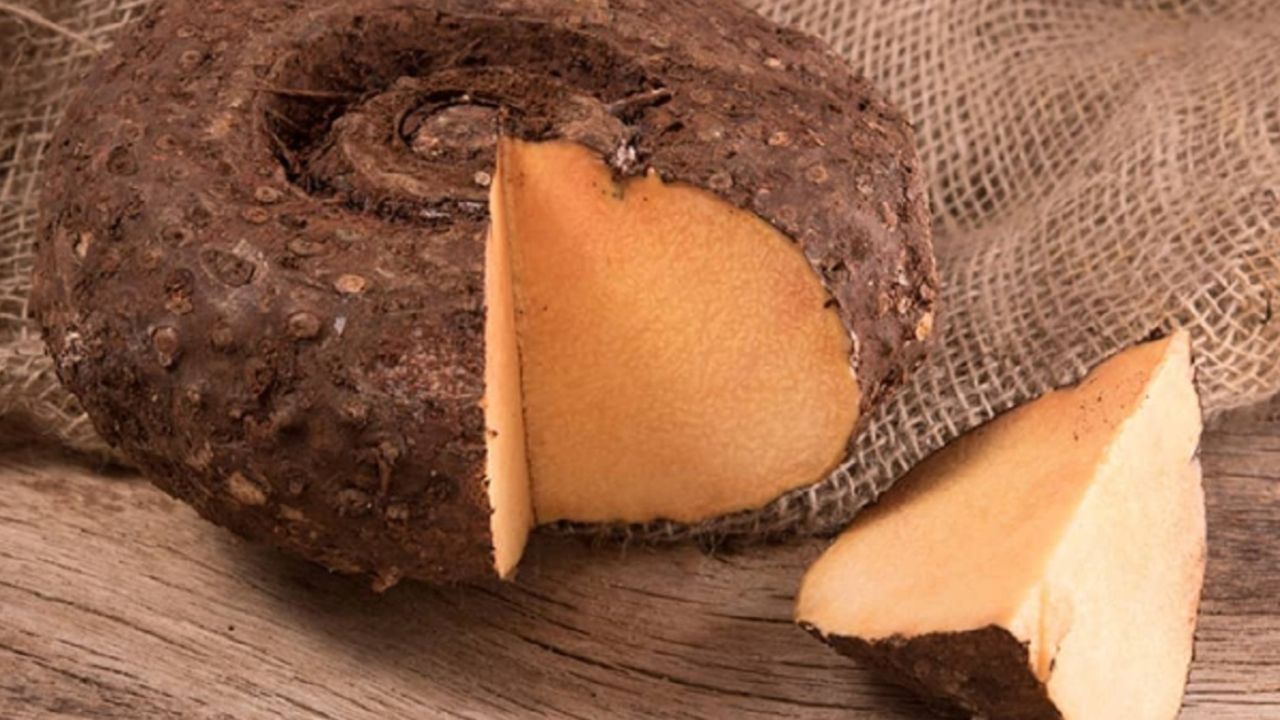Jimikand – Elephant Foot Yam: Discover the Health Benefits
Jimikand, scientifically known as Amorphophallus paeoniifolius, is commonly referred to as Elephant Foot Yam due to its distinctive shape resembling an elephant’s foot. This versatile tuber is a staple in many Asian cuisines, especially in India, where it is valued not only for its unique flavor but also for its impressive nutritional profile.

The soft, starchy texture of Jimikand makes it an ideal ingredient in various dishes, from curries to stir-fries, providing both substance and flavor. In addition to its culinary uses, Jimikand has garnered attention for its myriad health benefits.
Rich in dietary fiber, vitamins, and minerals, it contributes to digestive health, supports weight management, and promotes heart health. The tuber’s ability to boost the immune system and improve skin health further solidifies its place as a valuable food source.
In recent years, there has been a growing interest in the health benefits of Jimikand, making it an important addition to the diet for those seeking holistic well-being. Nutritionists and health enthusiasts alike are recognizing its potential to improve overall health and vitality.
Understanding the health benefits of Jimikand can encourage its incorporation into daily meals, offering a natural way to enhance health and wellness. By exploring its various uses and benefits, individuals can make informed choices about including this nutrient-dense tuber in their diets, ultimately leading to a healthier lifestyle.
Different Names of Jimikand (Elephant Foot Yam)
Jimikand, known scientifically as Amorphophallus paeoniifolius, is recognized by various names across different regions. Here are some of the common names for this versatile tuber:
- Suran: Commonly used in Gujarat and Uttar Pradesh.
- Elephant Foot Yam: The widely recognized name in English-speaking regions.
- Whitespot Giant Arum: Another name that reflects its botanical classification.
- Ol: Used in Bangladesh.
- Oal: The name for Jimikand in Bihar.
- Zimmikanda: Commonly referred to in Chhattisgarh.
- Batema: Known by this name in Tripura.
- Suvarnagadde: This is the name used in Karnataka.
- Chena: The term used in Kerala.
- Kaaraa Karunai Kizangu: The name in Tamil Nadu.
- Kaan or Oal: Used in Nepal.
- Pongapong: The name for Jimikand in the Philippines.
Understanding these different names enhances appreciation for the nutrition and health benefits of Jimikand, also known as Elephant Foot Yam, in various cultures.
Nutritional Profile of Jimikand
Key Nutrients and Vitamins Present in Jimikand, Jimikand is packed with a variety of essential nutrients that contribute to its health benefits:
Dietary Fiber: A significant component that aids digestion and helps maintain gut health.
Vitamins:
- Vitamin C: An antioxidant that supports immune function and skin health.
- B-complex Vitamins: Including B6, which is crucial for brain health and metabolism, and folate, essential for cell division and DNA synthesis.
- Vitamin E: Known for its antioxidant properties, supporting skin health and protecting against cellular damage.
Minerals:
- Potassium: Important for regulating blood pressure and maintaining proper muscle and nerve function.
- Magnesium: Supports muscle and nerve function, as well as energy production.
- Iron: Vital for transporting oxygen in the blood.
Comparison to Other Root Vegetables
When compared to other popular root vegetables like potatoes and sweet potatoes, Jimikand stands out for its lower calorie count and higher fiber content.
For example, while 100 grams of boiled potato contains about 87 calories and 2.2 grams of fiber, the same amount of boiled Jimikand provides approximately 80 calories and 5 grams of fiber.
This makes Jimikand a more favorable option for those seeking to manage their weight while still enjoying hearty, filling foods.
Health Benefits of Jimikand
Below are some of the benefits of Health Benefits of Jimikand
1. Digestive Health
The high fiber content in Jimikand plays a crucial role in promoting digestive health. Fiber aids in:
- Regularity: By adding bulk to the stool, fiber helps prevent constipation and promotes regular bowel movements.
- Gut Health: Jimikand acts as a prebiotic, nourishing beneficial gut bacteria, which can enhance overall digestive health and improve the microbiome balance. A healthy gut microbiome is linked to improved digestion, better nutrient absorption, and even mood regulation.
Research indicates that a high-fiber diet can help prevent digestive disorders, such as irritable bowel syndrome (IBS) and diverticulitis. Therefore, incorporating Jimikand into your diet can be a simple yet effective way to support digestive well-being.
2. Weight Management
For those looking to maintain or lose weight, Jimikand is an excellent choice due to its low-calorie and high-fiber content. Here’s how it helps:
- Satiety and Appetite Control: The fiber in Jimikand increases feelings of fullness, which can reduce overall calorie intake. Consuming fiber-rich foods like Jimikand can help you feel satisfied for longer periods, curbing unnecessary snacking and overeating.
- Impact on Blood Sugar Levels: Jimikand has a low glycemic index, meaning it doesn’t cause rapid spikes in blood sugar. This is particularly beneficial for individuals managing diabetes or those at risk of developing insulin resistance. Stable blood sugar levels are key for effective weight management.
A balanced diet that includes Jimikand can be a strategic approach for anyone aiming to maintain a healthy weight while enjoying delicious meals.
3. Heart Health
The heart health benefits of Jimikand are notable due to its antioxidant properties and mineral content:
- Antioxidants: Jimikand is rich in antioxidants, which help combat oxidative stress and inflammation—two major contributors to heart disease. Antioxidants can reduce the risk of plaque buildup in arteries, lowering the risk of heart attacks and strokes.
- Potassium Content: High potassium intake is linked to lower blood pressure levels. By counteracting the effects of sodium and relaxing blood vessel walls, potassium helps regulate blood pressure and supports overall cardiovascular health. Including Jimikand in your diet can contribute to these beneficial effects.
Research consistently shows that diets rich in fruits, vegetables, and tubers like Jimikand are associated with a lower risk of heart disease, making it a valuable addition to heart-healthy eating plans.
4. Skin Health
Jimikand’s antioxidant properties extend to its benefits for skin health. Here’s how it contributes:
- Antioxidants and Skin Protection: The antioxidants in Jimikand can help protect skin cells from damage caused by free radicals and UV radiation. This protection is essential for maintaining youthful, healthy skin.
- Reduction of Inflammation and Aging Signs: Regular consumption of Jimikand may help reduce skin inflammation, which can contribute to conditions like acne or eczema. Moreover, antioxidants can help combat signs of aging, such as wrinkles and fine lines.
Incorporating Jimikand into your diet not only nourishes your body but also supports your skin’s appearance and health, making it a worthwhile choice for beauty enthusiasts.
5. Immune System Boost
The vitamins and minerals in Jimikand provide essential support for the immune system:
- Vitamin C: This vitamin plays a crucial role in strengthening the immune response, helping the body fight off infections and illnesses.
- Minerals: Nutrients like zinc and iron are vital for maintaining a robust immune system. They support various immune functions, including the production of immune cells and the regulation of inflammation.
By including Jimikand in your diet, you can help fortify your immune system, particularly during cold and flu seasons or periods of increased stress.
Culinary Uses of Jimikand
Popular Dishes and Recipes Featuring Jimikand, Jimikand can be used in a variety of culinary applications, showcasing its versatility:
- Curries: A popular way to prepare Jimikand is to include it in spicy curries. The tuber absorbs flavors well, enhancing the dish’s overall taste.
- Stir-Fries: Sliced Jimikand can be added to vegetable stir-fries, providing a unique texture and nutritional boost.
- Soups: Pureed Jimikand can serve as a thickening agent for soups, adding both creaminess and nutritional value.
- Roasted Dishes: Roasting Jimikand with spices creates a delicious and healthy side dish. Toss it with olive oil, salt, and your favorite spices, then roast until golden brown.
- Chips: Thinly sliced and baked Jimikand can be a healthy alternative to traditional potato chips.
Tips for Incorporating Jimikand into Your Diet
To make the most of Jimikand’s health benefits, consider these tips:
- Start Slowly: If you’re new to eating Jimikand, start with small amounts to allow your digestive system to adjust to the increased fiber.
- Pair with Other Ingredients: Combine Jimikand with other vegetables, grains, or proteins for balanced meals. It pairs well with lentils, chickpeas, and various spices.
- Experiment with Flavors: Jimikand has a mild taste, making it adaptable to various flavor profiles. Experiment with spices like turmeric, cumin, and coriander to enhance its flavor.
By getting creative in the kitchen, you can enjoy the diverse culinary possibilities of Jimikand while reaping its health benefits.
Jimikand in Traditional Medicine
Historically, Jimikand has been utilized in traditional medicine systems like Ayurveda. Below are a few more uses.
- Ayurvedic heritage: Jimikand has deep roots in Ayurveda, a traditional Indian medical system.
- Anti-inflammatory properties: Believed to possess anti-inflammatory qualities, helping reduce inflammation in the body.
- Detoxifying effects: Often used as a natural detoxifier, aiding in removing toxins from the system.
- Digestive health: Historically recommended for treating various digestive issues and promoting gut health.
- Respiratory ailments: Used as a remedy for respiratory problems, such as coughs and colds.
- Arthritis relief: May offer relief from arthritis symptoms due to its anti-inflammatory properties.
- Skin health: This can be applied topically to treat skin conditions and promote healthy skin.
- Antioxidant properties: Jimikand contains antioxidants that can help protect cells from damage caused by free radicals.
- Immune system support: Some believe that Jimikand can help boost the immune system, making it more effective at fighting off infections.
- Blood sugar regulation: Traditional practitioners have used Jimikand to help regulate blood sugar levels.
- Mental health support: In some cultures, Jimikand is believed to have calming and stress-reducing properties.
Growing and Harvesting Jimikand
Jimikand is primarily cultivated in tropical and subtropical regions. Here’s what to know about growing and harvesting this nutritious tuber:
- Cultivation: Jimikand thrives in well-drained, loamy soil with good moisture retention. It prefers a warm climate with temperatures between 20°C to 30°C (68°F to 86°F).
- Planting: The tubers are typically planted in the rainy season, and they take about 7-9 months to mature.
- Harvesting: Once the leaves start to yellow, it indicates that the tubers are ready for harvest. Care should be taken during harvesting to avoid damaging the tubers.
Growing your own Jimikand can be a rewarding experience, allowing you to enjoy this nutritious food fresh from your garden.
Safety and Precautions
While Jimikand is generally safe for consumption, there are a few precautions to consider:
- Cooking Required: Raw Jimikand can be irritating to the throat and stomach due to the presence of calcium oxalate crystals. Always ensure it is thoroughly cooked before consumption.
- Allergies: Some individuals may have allergies or sensitivities to Jimikand. It’s advisable to introduce it into your diet gradually and monitor for any adverse reactions.
Side Effects of Jimikand (Elephant Foot Yam)
While Jimikand, also known as Elephant Foot Yam, offers numerous health benefits, there are potential side effects to be aware of. Consuming this tuber may lead to the following symptoms or issues:
- Itching and Irritation: Some individuals may experience itching or irritation in the mouth or throat after consuming Jimikand.
- Burning Sensation: A burning sensation in the mouth is another possible reaction, especially if consumed raw.
- Itchy Skin: Skin irritation, including itching, may occur in some people.
- Reddening of the Skin: Consumption of Elephant Foot Yam might lead to reddening of the skin in sensitive individuals.
- Increased Oxalate Secretion: Jimikand may increase oxalate secretion in urine, which can be a concern for those susceptible to kidney stones.
- Wheals on the Skin: In rare cases, it can cause wheals or hives on the skin.
- Respiratory Symptoms: People with asthma, bronchitis, sinus infections, or colds may find that Jimikand worsens their symptoms due to its cooling effect on the body.
If you experience any of these adverse reactions after consuming Jimikand, it’s important to consult a doctor for appropriate guidance.
Being aware of these potential side effects can help you enjoy the nutritional benefits of this tuber while minimizing any discomfort.
FAQs
Q1: What is Jimikand, and where is it commonly found?
A: Jimikand, also known as Elephant Foot Yam (Amorphophallus paeoniifolius), is a tuberous vegetable commonly found in tropical and subtropical regions, especially in India and Southeast Asia. It is valued for its unique flavor and nutritional benefits.
Q2: What are the key health benefits of Jimikand?
A: Jimikand offers several health benefits, including digestive health, weight management, heart health, skin health, and immune support.
Q3: How can I incorporate Jimikand into my diet?
A: There are many ways to enjoy Jimikand, such as in curries, stir-fries, soups, roasted dishes, or even as chips.
Q4: Are there any precautions to take when consuming Jimikand?
A: Yes, always cook Jimikand before consumption to avoid irritation from calcium oxalate crystals, and introduce it gradually if you have allergies.
Q5: What is the nutritional profile of Jimikand?
A: Jimikand is rich in dietary fiber, vitamins (like C and B-complex), and minerals (such as potassium, magnesium, and iron).
Q6: Can Jimikand help with weight loss?
A: Yes, Jimikand can aid in weight loss due to its low calorie and high fiber content, promoting fullness and stable blood sugar levels.
Q7: How does Jimikand benefit heart health?
A: Jimikand contributes to heart health through its antioxidants, which reduce oxidative stress, and its potassium content, which helps regulate blood pressure.
Q8: Is Jimikand used in traditional medicine?
A: Yes, Jimikand has been used in traditional medicine, particularly in Ayurveda, for its anti-inflammatory and detoxifying properties.
Q9: How can I grow Jimikand at home?
A: To grow Jimikand, use well-drained, loamy soil, plant it in a warm climate during the rainy season, and harvest when the leaves start to yellow.
Q10: What are some common recipes featuring Jimikand?
A: Common recipes include Jimikand curry, stir-fried Jimikand, Jimikand chips, and mashed Jimikand.
In conclusion, Jimikand is a flavorful and versatile ingredient and a powerhouse of health benefits. Embracing this tuber can lead to improved health outcomes and culinary enjoyment.


























I had no idea Jimikand had so many health benefits! It’s great to learn about this nutritious root and its potential for overall wellness.